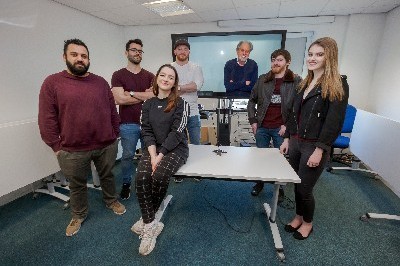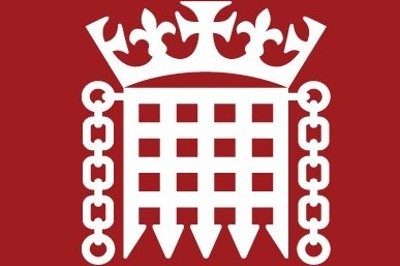Students selected for film legend’s mentoring scheme
Source: University of Sunderland
Six students who underwent a vigorous selection process have now been chosen to work with Lord Puttnam on his unique mentoring scheme over an intensive three-month period.
The ‘Puttnam Scholars’ programme will involve the students taking part in a series of interactive seminars in the course of which Lord Puttnam will set them a film project to be completed by June.
Last year’s scholars made a 13-minute documentary highlighting the plight of asylum seekers and refugees. ‘In Limbo’ shone a light on the struggle faced by refugees and those seeking asylum in the region, as well as the dedicated work of the workers and volunteers trying to help them, it was screened across the North East as well as in festivals and competitions.
This year’s group – James MacNeil, Katie Stubbs, João Chambel, Luke Adam Smith, Millie Bourke and Abdullatif Mahjoub – met with the Labour Peer at the House of Lords, to discuss and launch the programme.
All students are at various stages of their university journey from first year to post graduate study.
Lord Puttnam, the first Chancellor of the University of Sunderland (1997-2007), and an Oscar-winning producer of films including Chariots of Fire, The Mission, The Killing Fields and Midnight Express, said: “Having thoroughly enjoyed working with the first two cohorts of scholars, this year’s group promises to be every bit as committed and dynamic as their predecessors. The truth is that I learn as much from their energy and insights as I’m ever able to offer in return. I can’t wait to get thoroughly stuck into their film project.”
Pro Vice-Chancellor Graeme Thompson, added: “This is once again a great opportunity for our students to be selected for the Puttnam Scholars programme.
“Lord Puttnam is a tremendous supporter of our university and we are delighted he has chosen to continue this unique programme with us. It’s been a tremendous success which has helped shaped our previous scholars’ studies and career choices.”

What the students say
Katie Stubbs, from South Tyneside, is studying Screen Performance and hopes to gain a better insight into the film industry as well as produce a high-quality professional film which she can showcase and use for future job applications.
She added: “I applied to become a Puttnam Scholar as this opportunity does not come around often. To be mentored by someone of such great success will greatly benefit me in the future. The first session was very interesting and I learnt a great deal from Lord Puttnam, discussing identity within the film industry.”
James MacNeil, from the Isle of Lewis, Stornoway in Scotland, is in the final year of the Media Production course.
He explained what he hoped to get out of the programme. “I hope to gain an insight into the creative process of filmmaking with guidance from a highly regarded producer as well as collaborating with talented individuals also dedicated to the field.
“I applied for the programme to further my career and to prove to myself I can make it in this industry that I am so passionate about. The first session last Friday opened my eyes to some of the history of filmmaking: including prominent figures, particularly Charlie Chaplin's, importance to the growth of cinema and film.”
João Chambel, from Portugal, is studying Film Production, he said: “I hope to get behind the scenes knowledge from an experienced name in Hollywood. The first session went fine, especially the "Oscar Flex" moment and David's words on Charlie Chaplin.”
Abdullatif Mahjoub, from Syria, studying Digital Film Production, said: “I hope to move to a higher level in the film industry and expand my knowledge in terms of theories, craftsmanship, and implementation.
“This programme is a golden opportunity to be under the care and supervision of Lord Puttnam, who has global experience in making films and is passing on his experiences to us.
“It is great that we will make a film and it will not be limited to theoretical matters, and we can apply what we will learn.”
He added: “The first session was full of cinema history that we should always remember because it is the first seeds in the field of films. Also, it confirms to me that most films are based on the character, opinion, and the history of the filmmaker. The filmmaker reflects what is inside it, whether it is negative or positive on the screen, in order to allow everyone to share these reflections.”
Luke Adam Smith, from Sunderland, who recently completed his Masters Degree in Media Production (TV and Film), says he hopes the programme will help iron out any weak points he may have and produce a film to be proud of. Adding: “Learning from David Puttnam is a brilliant opportunity and experience.
“The session on Friday went amazingly well, we discussed Identity in film and all aspects of that, Putnam gave us all a chance to speak our mind and ask questions while referring to film examples he had used within the presentation.
Millie Bourke, from Darlington, studying Digital Film Production, said: “From this experience I hope to learn something new and become more professional at filmmaking as a craft. I want to come away from this having the confidence to carry on making creative products that say something. I applied to become a scholar because I knew this experience would help me establish myself better and help me gain more knowledge on my future career.
“The first session we had with Lord Puttnam was already very informative and exciting, he has a lot he is willing to share with us and isn’t afraid to tell us what’s what.”



